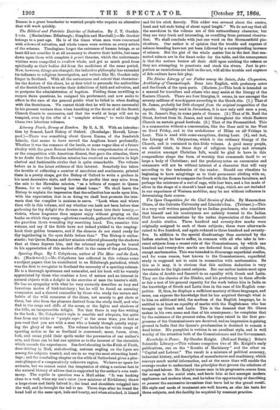The Open Competition for the Civil Service of India. By
Manomohan Ghose, of the Calcutta University and Lincoln's Inn. (Trubner.)—This is a very well written pamphlet by an Indian gentleman, who considers that himself and his countrymen are unfairly treated in the Indian Civil Service examinations by the undue depreciation of the Sanscrit and Arabic studies. Three hundred and seventy-five marks were originally assigned to each of these subjects ; these were afterwards raised to five hundred, and again reduced to three hundred and seventy- five. In addition to the special disadvantage thus sustained by the Indian student, he has to suffer, in common with all who take in low- rated subjects from a recent rule of the Commissioners, by which one hundred and twenty-five marks are deducted from all subjects alike, except mathematics. This waaintended to discourage superficial studies, and for some reason, best known to the Commissioners, superficial study is supposed not to exist in connection with mathematics. Be this as it may, it is obvious that this uniform deduction is very favourable to the high-rated subjects. But our author insists most upon the claim of Arabic and Sanscrit to an equality with Greek and Latin. They are the classics of the Hindoo, and his proficiency in them affords as fair a test of his general capacity for the work before him in India as the knowledge of Greek and Latin does in the case of his English com- petitor. If, then, he displays a sufficient mastery of these langnages, and more, can express the knowledge that he has acquired through what is to him an additional trial, the medium of the English language, he is entitled to at least an equality of marks with the Englishman who has brought up Greek and Latin. This is the demand that Mr. Ghose makes in his own name and that of his countrymen ; he complains, that by the existence of the present rules, the hopes raised in the first pro- gramme of the Commissioners are deceived, and an impression is gaining ground in India that the Queen's proclamation is destined to remain a dead letter. His pamphlet is written in an excellent style, and is well worthy of the attention both of the Commissioners and the Government.


































 Previous page
Previous page